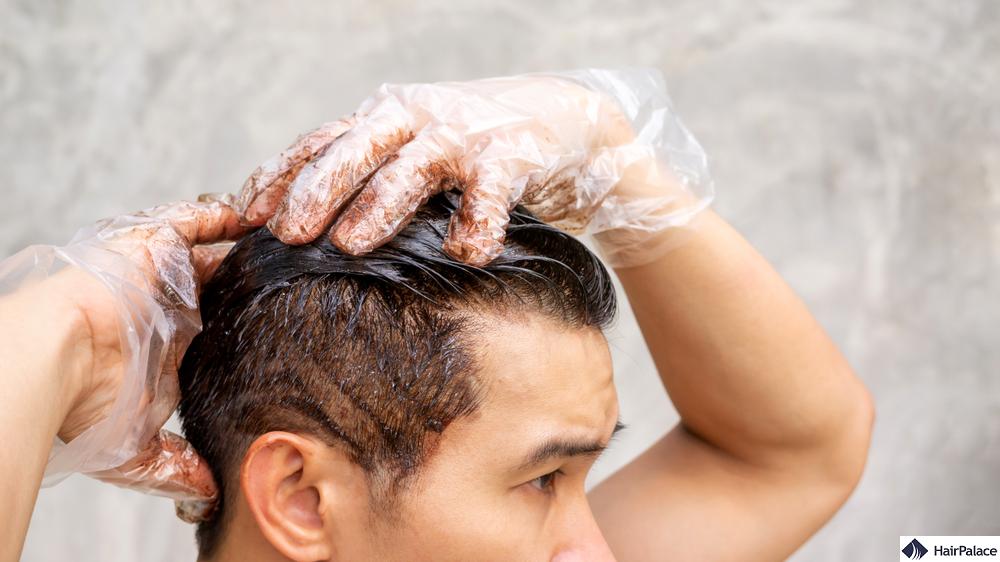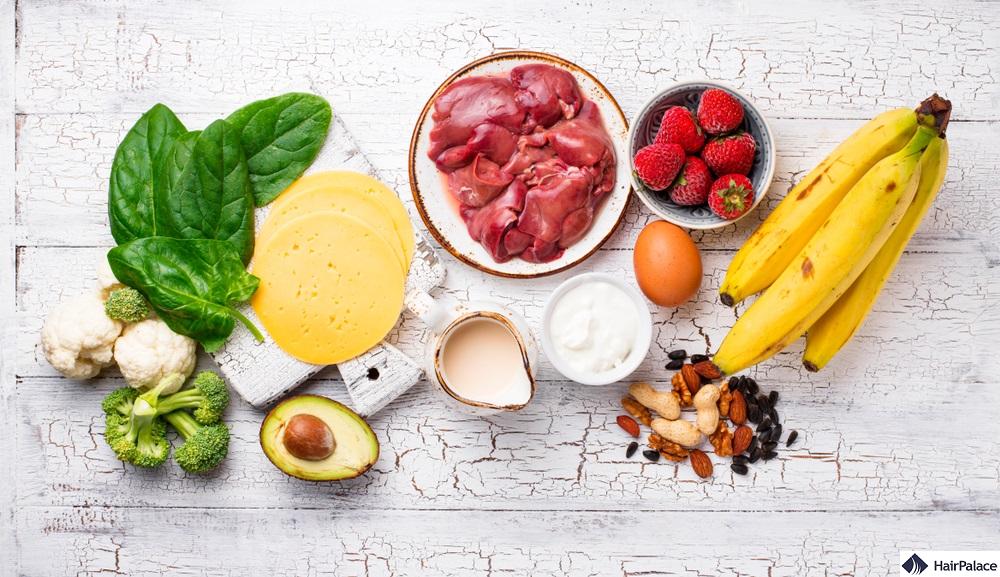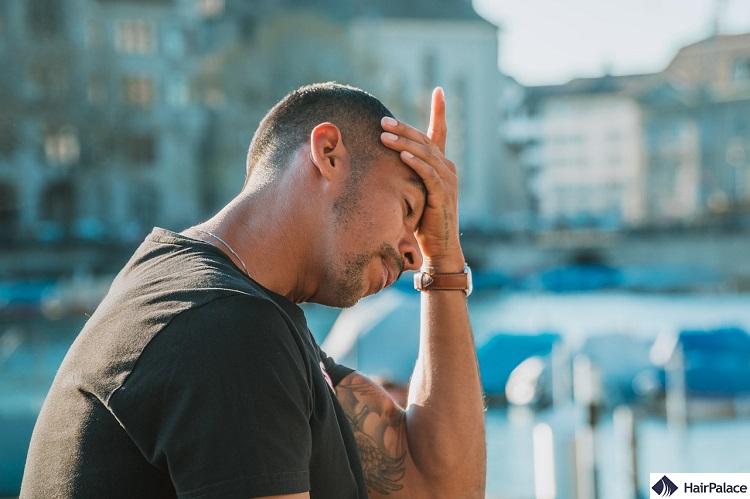How to Get Thicker Hair: 10 Expert Tips for Men in 2025

If your hair is thinner than it used to be, you’re not alone: hair loss (particularly androgenetic alopecia or male pattern baldness) is widespread among men.
Pattern baldness affects around 50% of men over 50 years old, and can cause varying degrees of hair loss, from receding hair to a bald spot on the crown of your scalp.
Fortunately, if you want to get thicker hair, there are multiple options available.
We’ve put together the following list of 10 tips to help you find the best way to thicken hair.
- Take care when styling
- Quit smoking
- Wash your hair less
- Be careful with home treatments
- Get a professional advice
- Consider medications
- Get nutrients
- Learn more about supplements
- Decrease stress levels
- Get the right haircut
- Get a hair transplant
How to get thicker hair for men
Take Care When Styling Your Hair
If your hair is thinner than usual, take extra care when styling it: a gentle approach can prevent more hair from falling out.
Keep the following tips for thick hair in mind for the best results:
- Avoid pulling your hair when combing or applying products, particularly when your hair’s wet.
- Use a comb with wide teeth (especially on wet hair), as one with thin teeth can pull hair out.
- Try a new hairstyle that suits your thinning hair, which should make it easier to get your hair how you want it. Your barber or stylist should be able to suggest a flattering look.
- Minimise the amount of time you spend blow-drying your hair, and use a low heat setting to prevent your hair from drying out.
- Reduce the amount of time that you spend wearing your hair in tight styles, such as ponytails or braids, as these can put unnecessary strain on your hair and follicles.
Changing your hairstyle and hair care habits may take some time, but it can make a difference to your hair’s health and appearance in the long run.
Quit Smoking for Thicker Hair (and a Healthier Lifestyle)
Everyone knows smoking is extremely unhealthy. But if you want to know how to thicken hair, kicking the habit could bring positive results.
Why? Because researchers have found associations between smoking and hair fall.
Cigarettes have also been shown to increase the risk of developing grey hair before 30 years of age, so going smoke-free could help you keep your hair and maintain your natural colour for longer.
Stopping smoking can also increase your lung capacity by up to 10% within 9 months, improve your immune system, and reduce stress levels (according to the NHS).

Wash Your Hair Less Often
Your hair may look, feel, and smell fantastic after you wash it — but you might not need to shampoo it every day.
Two or three times per week should be enough to clean your hair and scalp effectively.
Use a gentle shampoo designed to moisturise and nourish your hair, to avoid drying it out.
Condition your hair parting after rinsing out shampoo, too, to reinforce it with a protective coating.
This can decrease the likelihood of splitting and breakage.
Washing your hair won’t cause hair loss alone, but you can help to make it stronger and healthier if you take a gentler approach.
Be Careful with Home Treatments
Love to bleach or dye your hair at home? You might be making your hair loss worse.
Colouring and heating treatments can leave hair weaker and cause more shedding than usual.
However, you may not want to give up hair colouring or heated styling tools if the results improve your self-confidence. In that case, speak to your stylist.
They may be able to suggest alternative treatments that achieve the look you want with fewer harmful chemicals and heat-based tools.

Visit Your Doctor for scientifically proven ways to grow thicker hair
When discussing how to make hair thicker, visiting your doctor could be the first step towards finding a solution.
They may refer you to a dermatologist who treats conditions affecting the skin and hair.
A dermatologist can identify the reasons for your hair loss after an in-depth examination, such as skin infections of the scalp or hereditary conditions.
They might also offer advice and assist you in finding suitable hair growth products or medication.
Consider Medications (If Necessary)
You can try various medications designed to treat hair loss, including male pattern baldness.
You’ll need a prescription for some, though you can buy others (e.g. minoxidil, or Rogaine) over the counter.
Minoxidil may stop hair thinning or cultivate hair regrowth over several months.
Various products contain minoxidil, including topical foams and liquids, as well as shampoos.
You can buy products containing 10% minoxidil, as well as 5% and 2%, with only the latter two having FDA approval.
Alternatively, your doctor can prescribe finasteride, an oral medication available as Propecia.
Like minoxidil, finasteride may prevent further hair thinning and encourage new growth.
However, you’ll need to keep using it consistently to achieve and maintain results.

Vitamins for thicker hair
Poor nutrition could play a key part in your hair loss.
If you lack important nutrients in your diet, such as vitamins, minerals, and protein, your body won’t have everything it needs to maintain healthy thick hair growth.
Iron and zinc are two critical minerals responsible for hair growth, but you may not consume enough if you’re vegetarian or vegan, or you’ve reduced your calorie intake drastically.
According to the NHS, the recommended daily amount of iron for men over 18 is 8.7mg.
Fortunately, many foods are rich in iron. A few examples:
- Eggs
- Leafy greens
- Kidney beans
- Edamame beans
- Chickpeas
- Red meat
- Dried fruit (e.g. apricots)
And for zinc, try to get the recommended 9.5mg per day through the following foods:
- Legumes
- Nuts
- Seeds
- Bread
- Cereals
- Dairy produce
- Red meats
You may need to significantly change your diet to consume more of these foods, but it should feel worthwhile if your hair growth improves.
You might want to check with your doctor if you plan to overhaul your diet extensively in an attempt to increase hair thickness.

Speak to a Doctor About Supplements
Supplements can help you get the vitamins and minerals you need to maintain healthy hair, but you should consult your doctor to understand the potential side effects.
For example, excess zinc or iron can contribute to toxicity and other issues.
Furthermore, biotin (part of the B vitamin family) has been linked to hair regrowth in some cases.
However, people often have healthy biotin levels anyway without needing supplements for thicker hair.
Similarly, avoid getting more vitamin A, E, and selenium than you need — over-supplementation can contribute to hair loss.
Decrease Your Stress Levels
According to the Stress Management Society, stress caused 74% of adults in the UK to feel “overwhelmed or unable to cope” in 2020.
Too much stress can lead to a number of health problems, including telogen effluvium — a condition that leads to more hair loss than usual.
Fortunately, this is typically temporary and should resolve if you can reduce your stress levels.
If you struggle to manage your stress, ask your doctor for advice.

Short haircut for thin hair to look thicker
Choosing the right short haircut can significantly enhance the appearance of thin hair by adding volume and creating the illusion of thickness.
Opt for layered cuts that add movement and avoid a flat look, or consider a textured bob to create depth.
A blunt cut can make strands appear fuller, while styles like the pixie cut can add dimension and make hair look denser.
Additionally, incorporating subtle bangs or a side-swept fringe can frame the face beautifully and give the hair more body.
Using lightweight styling products and techniques, such as blow-drying with a round brush, can further enhance volume and ensure your short haircut looks vibrant and thick.
Try a Hair Transplant to Restore Growth
If you’re considering how to make hair thicker, hair transplantation could be the solution you need.
These treatments are more widely available and affordable than ever, while celebrities like Calum Best and Joe Swash have helped to make them more mainstream by discussing their own experiences openly.
Hair replacement surgery involves transplanting hair follicles from areas of the scalp with healthy hair growth to those affected by thinning.
The most advanced techniques, including the FUE and DHI method, can lead to natural hair regrowth with success rates up to 90 – 95%.
Find Out More About Hair Transplants
HairPalace’s experienced surgeons have helped thousands of UK men with hair replacement surgery procedures.
You can schedule a no-obligation appointment with a member of our team to learn more about how to thicken hair with our transplants, as well as our competitive rates and written treatment guarantee.
FAQ
Follow these tips to naturally make your hair thicker:
● Avoid using dry shampoo excessively.
● Never wash your hair with shampoos containing sulfate.
● Eat a balanced diet without restricting foods that contain essential nutrients.
● Consume the recommended amount of vitamin C (40mg for adults, according to the NHS website).
● Use a low setting on heated styling tools to avoid drying the hair out too much.
Try the following ideas to make your hair thicker:
● Colour your hair less often.
● Trim your hair regularly to encourage faster growth.
● Eat a healthy diet to give your hair the nutrients it needs.
● Avoid shampooing every day.
● Brush your hair gently before you go to bed.
● Handle wet hair carefully, as it’s more vulnerable to damage.
● Use cold water to rinse your hair after shampooing.
● Cut down on heated styling tool usage.
Your hair won’t become thicker again without treatment if male pattern baldness is to blame for your shedding. But if telogen effluvium is the sole cause, your usual hair growth should continue within around six months with no need for professional assistance.
To maintain healthy, thick hair that grows quickly, good fats are vital. You can source these from nuts, olive oil, and foods rich in omega-3. Other helpful foods include figs, eggs, and mangoes, as they’re packed with zinc, protein, and silica. These encourage the body to produce collagen and enhance your general immunity, promoting healthy hair growth.
To achieve thicker, healthier hair, maintain a balanced diet rich in vitamins and proteins, avoid excessive heat and harsh treatments, use gentle, volumizing shampoos, regularly trim to prevent split ends, and incorporate scalp massages to stimulate growth. Additionally, manage stress and stay hydrated to support overall hair health.
No, shaving does not make hair grow back thicker. When you shave, you cut the hair at the surface of the skin, which creates a blunt edge. As the hair grows out, this blunt edge can make the hair appear coarser and darker, giving the illusion of increased thickness. However, shaving does not affect the hair follicle beneath the skin, so the actual thickness and growth rate of the hair remain unchanged.
Last medically reviewed on October 20th, 2025
- Koyama T, Kobayashi K, Hama T, Murakami K, Ogawa R. Standardized Scalp Massage Results in Increased Hair Thickness by Inducing Stretching Forces to Dermal Papilla Cells in the Subcutaneous Tissue. Eplasty. 2016 Jan 25;16:e8.https://www.ncbi.nlm.nih.gov/pmc/articles/PMC4740347/
- Prager N, Bickett K, French N, Marcovici G. A randomized, double-blind, placebo-controlled trial to determine the effectiveness of botanically derived inhibitors of 5-alpha-reductase in the treatment of androgenetic alopecia. J Altern Complement Med. 2002 Apr;8(2):143-52. https://doi.org/10.1089/acm.2002.8.143
- Trost LB,Fowler Bergfeld W, Calogeras E.The diagnosis and treatment of iron deficiency and its potential relationship to hair loss. Journal of the American Academy of Dermatology. 2006 May;54(5):824-844. https://doi.org/10.1016/j.jaad.2005.11.1104
- Buffoli B, Rinaldi F, Labanca M et al. The human hair: from anatomy to physiology. Int J Dermatol 2014;53: 331–341https://doi.org/10.1111/ijd.12362
- Guo EL, Katta R. Diet and hair loss: effects of nutrient deficiency and supplement use. Dermatol Pract Concept. 2017 Jan 31;7(1):1-10.https://doi.org/10.5826/dpc.0701a01


